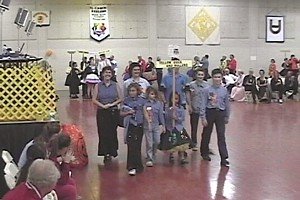Fortress gameThis game is similar to the preceding game. Three parallel lines are made around a hollow square not less than 25 to 40 feet in dimensions. This square is known as the fortress. A small space is marked off in the centre of the fortress for a prison. Two captains are selected. These two choose the members of their own teams, in turn. One team is known as the defenders, the other as the attackers. The defending party
takes a position within the fortress and the attacking party is scattered around the outside of the fort. Both are under the command of their captains.
The attacking party may charge the fort as a group or may use any tactics the captain may decide upon. He may feign an attack on one side to draw the defenders' attention, while his principal attack may be directed towards another point of the fortress. The methods of engagement are as follows:
Opponents endeavor to push, pull, or carry each other across the guard line. The defending players seek to force as many of the attacking players in across the inside line as possible. Succeeding in this, such players as have been drawn beyond the inside line are prisoners and must take their place in the prison. The attacking party seeks to force as many of the defenders beyond the outside line as possible.
Succeeding in this, all those so forced are placed in a small area, which constitutes the prison of the attacking army. The captain should seek to direct the strong against the strong as much as possible in personal combat. The captains may exchange prisoners if they so desire.
The game battle is won by either party making prisoners of all the opponents, or it may be won by the besiegers, if one of their number enters unattacked the prison within the fortress. Should the player accomplish this, he shouts, "Hole's won," whereupon the defenders must yield the fortress and the two armies change places, the defenders becoming the attackers, and vice versa. If an old fence is used for one
side of the fortress, the other guard line should be drawn five feet inside of the fence line.
The game attacking captain may withdraw his forces at any time for rest or consultation. Either captain may use a flag of truce for similar purposes. Under such conditions they arrange for an exchange of prisoners, etc.




